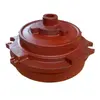Mobile:+86-311-808-126-83
Email:info@ydcastings.com
French
steel precision casting
The Importance of Steel Precision Casting in Modern Manufacturing
In today's fast-paced industrial landscape, the demand for high-quality components is ever-increasing. Among the various techniques available for manufacturing intricate parts, steel precision casting stands out as a crucial process. This method not only enhances the performance of components but also significantly contributes to the efficiency of various industries, including automotive, aerospace, and machinery.
Steel precision casting, also known as steel investment casting, involves the creation of metal parts by pouring molten steel into a mold that is designed to capture intricate details and produce complex shapes. This process begins with creating a wax pattern of the desired component, which is then coated with a ceramic material to form a shell. Once the shell is hardened, the wax is melted away, leaving a mold ready for pouring molten steel. The result is a highly accurate part with excellent surface finishes and tight tolerances.
One of the primary advantages of steel precision casting is its ability to produce components with complex geometries that are often challenging to achieve through traditional machining methods. This capability allows manufacturers to create lightweight structures without compromising strength, making it particularly advantageous in sectors such as aerospace, where reducing weight can lead to significant fuel savings and enhanced performance.
Moreover, steel precision casting is known for its high dimensional accuracy. Parts produced through this method typically require minimal machining, which saves both time and costs. This precision translates into fewer defects and a higher degree of interchangeability among components, which is essential for large-scale production.
steel precision casting

In addition, the versatility of steel as a base material cannot be overstated. It can be alloyed with various elements to enhance properties like corrosion resistance, durability, and heat resistance, making it suitable for harsh environments. This adaptability ensures that precision cast parts meet specific industry standards and performance requirements.
Furthermore, the environmental benefits of steel precision casting are increasingly recognized. This method generates less waste compared to traditional manufacturing processes, as the near-net-shape production reduces scrap metal. Additionally, many steel foundries are adopting eco-friendly practices such as recycling materials and utilizing energy-efficient technologies, aligning with global sustainability goals.
As industries evolve and face new challenges, the importance of steel precision casting is set to grow. Its ability to produce high-quality, complex components efficiently is invaluable in meeting the demands of modern manufacturing. Businesses seeking to maintain a competitive edge must consider incorporating precision casting into their production processes.
In conclusion, steel precision casting is a pivotal element in contemporary manufacturing, offering a wealth of advantages that cater to the needs of various industries. Its precision, versatility, and sustainability make it an indispensable tool for manufacturers striving for innovation and efficiency. As technology advances, steel precision casting will undoubtedly play a significant role in shaping the future of industrial production.











